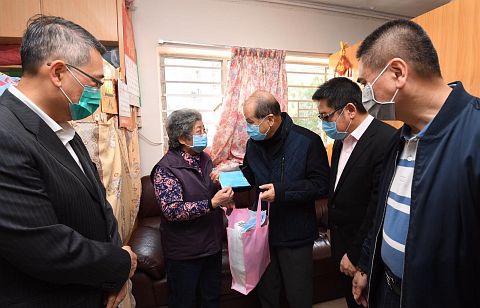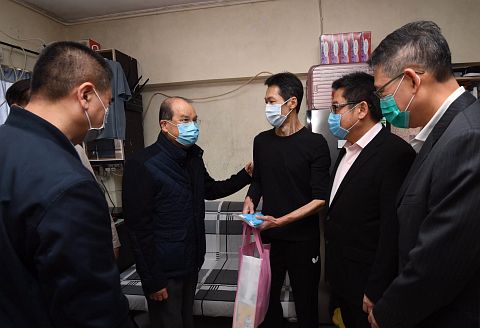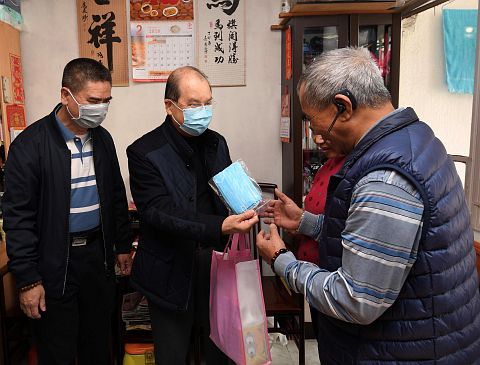Financial subsidies come in waves, optimise resources to build caring society
17 May 2020

|

|

|
The COVID-19 epidemic has struck an unprecedented blow at the Hong Kong economy and people's livelihood. Its impact on the grassroots and the under-privileged is particularly acute. As the Chairperson of the Commission on Poverty (CoP), I am deeply concerned about their predicament amidst the economic downturn.
The Appropriation Bill 2020 was passed by the Legislative Council (LegCo) three days ago. I believe that most Hong Kong people are looking forward to the early disbursement of $10,000 announced in the Budget. Registration will start from the end of June and disbursement will commence in July. Most eligible recipients will receive payments before the end of August.
Recipients of Old Age Living Allowance (OALA), Comprehensive Social Security Assistance (CSSA), Old Age Allowance (OAA), Disability Allowance (DA) and Individual-based Work Incentive Transport Subsidy (I-WITS) will receive extra payment of one-month's allowance, commonly known as "double pay". Disbursement may begin as early as mid-June, benefitting over 1.4 million people.1 Besides, the Government will pay one month's rent for eligible tenants living in public rental units of the Hong Kong Housing Authority and rental units of the Hong Kong Housing Society.
Over the past year, apart from the Budget initiatives, the Government also introduced waves of interlinking relief measures2 to be implemented successively in the months ahead. These measures of unprecedented breadth and depth will benefit millions of people including many at the grassroots level.
To provide dedicated support to industries and individuals afflicted by the epidemic, two rounds of relief measures totalling $150.5 billion have been launched under the Anti-epidemic Fund (AEF). These measures have been rolled out with over $18.5 billion disbursed so far. Many people have already received the subsidies.
The AEF also provides cash subsidies to, among others, frontline cleansing and security workers, drivers (e.g. public light bus drivers, taxi drivers, school bus drivers, school private light bus drivers and nannies) and construction workers. There will be around 900 000 beneficiaries under the subsidy schemes.
The student grant is especially important to grassroots families. The Government originally proposed a grant of $2,500 for each kindergarten, primary school and secondary day school student in the 2019/20 school year. In order to further alleviate the burden of educational expenses on parents during school closure, the grant is increased by $1,000 to $3,500 per student under the AEF, benefitting over 900 000 students. We have started to disburse the grant to parents and the processing of all applications received is expected to be completed by the end of this month.
Separately, the Government will start to directly disburse in batches a one-off special allowance to each eligible household under the Working Family Allowance (WFA) scheme and the means-tested Student Financial Assistance (SFA) scheme for pre-primary, primary and secondary students before the end of next month. It is expected that about 58 000 WFA households and 145 000 SFA households will benefit. To illustrate, a four-person WFA household with two school children eligible for the special allowance will receive a maximum of $6,400.
To relieve the burden of travelling expenses on members of the public, the monthly threshold of the Public Transport Fare Subsidy Scheme will be temporarily relaxed from $400 to $200 from July to December 2020. It is expected to benefit about 3.8 million people. The MTR Corporation Limited will also provide a 20% fare reduction for a period of six months, with the expenditure to be borne by the Government on a 50:50 matching basis.
Poverty alleviation is a policy priority of the Government. Apart from the above array of measures, the CoP and the Community Care Fund (CCF) have also been helping those facing economic difficulties and in need of assistance, and will launch a series of relief programmes in the coming months, including:
- One-off Allowance for New Arrivals from Low-income Families
Under the "One-off Allowance for New Arrivals from Low-income Families", a sum of $10,000 will be disbursed to those aged 18 or above who have entered Hong Kong for settlement for less than seven years and are in need of financial support. With a total funding of $2,131,040,000, the allowance is expected to benefit about 200 000 people. It will open for applications in September at the earliest. - One-off Living Subsidy for Low-income Households Not Living in Public Housing and Not Receiving CSSA
Under the "One-off Living Subsidy for Low-income Households Not Living in Public Housing and Not Receiving CSSA", two rounds of living subsidies will be disbursed to the "N have-nots" (i.e. low-income households not living in public housing and not receiving CSSA), benefitting around 242 650 households (about 625 600 persons)3. The first round will be open for application in stages starting from 2 July 2020, while the second round will commence in January 2021. The total provision for the 2020/21 programme will be $2,565,910,000. - Assistance Programme to Improve the Living Environment of Low-income Subdivided Unit Households
The two-year "Assistance Programme to Improve the Living Environment of Low-income Subdivided Unit Households" aims to provide a one-off non-cash subsidy4 for low-income subdivided unit (SDU) households to carry out minor improvement/repair works at home, purchase furniture and household goods as well as obtain pest control services, with a view to improving their living environment. Scheduled to be launched at the end of next month, the programme will benefit around 1624 000 SDU households. The subsidy amount ranges from $8,500 for a one-person household to $13,000 for a household of four or more persons. - Further Extending the Programme of "Subsidy for Comprehensive Social Security Assistance Recipients Living in Rented Private Housing"
To relieve the financial burden of rent increase on CSSA households, the CCF further extended the programme under the current mode of operation for a period of six months to October 2020. It is expected that about 16 000 households will benefit.
The Government will continue to optimise the use of its resources and spare no effort in implementing various initiatives to provide more comprehensive, targeted and appropriate support for grassroots citizens to ease their financial difficulties.
Two days ago, the Independent Police Complaints Council (IPCC) submitted to the Chief Executive its "Thematic Study Report on the Public Order Events arising from the Fugitive Offenders Bill since June 2019 and the Police Actions in Response". Overall speaking, the HKSAR Government accepts the recommendations proposed by the IPCC. The Secretary for Security will set up a task force to study and follow up on the recommendations in a serious manner.
Following its release to the public, there have been accusations that the report "supports the Police", "helps the Police" and "whitewashes the Force". Such comments reveal again that those ill-intentioned people will go all out to malign the Police. During the past ten months, the IPCC, which is an independent statutory body, has conducted a conscientious, in-depth, objective and detailed study to ascertain the facts of the incidents, saying what is right as right and denouncing what is wrong as wrong. They then came up with 52 objective and constructive recommendations. Members of the public should not hastily believe in the one-sided, misleading messages or false accusations circulated on the Internet. I urge everyone to return to rationality and make a fair and impartial evaluation of the report.
After all, Hong Kong should say no to violence!

